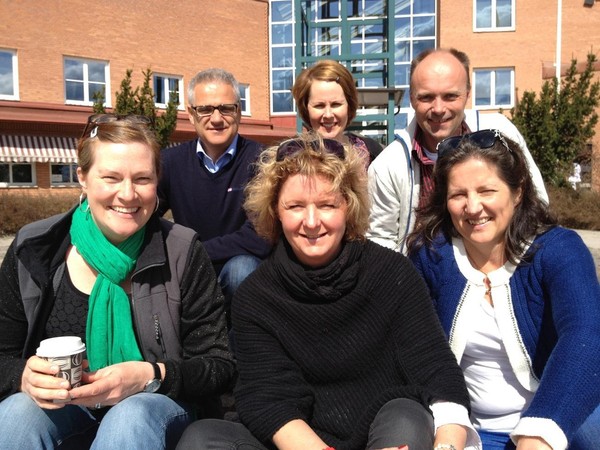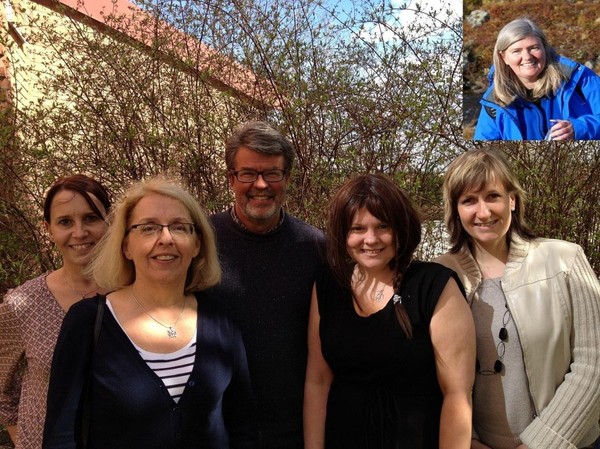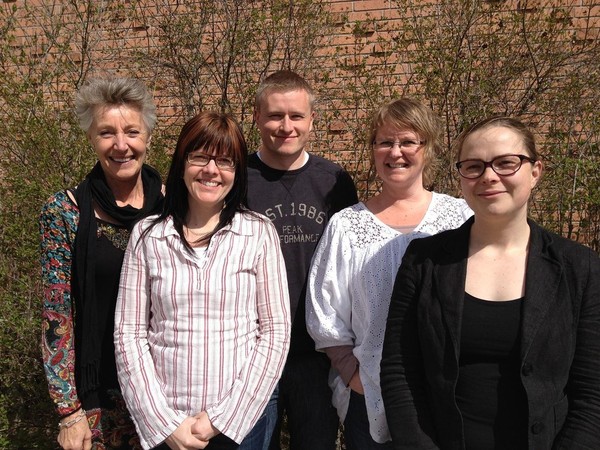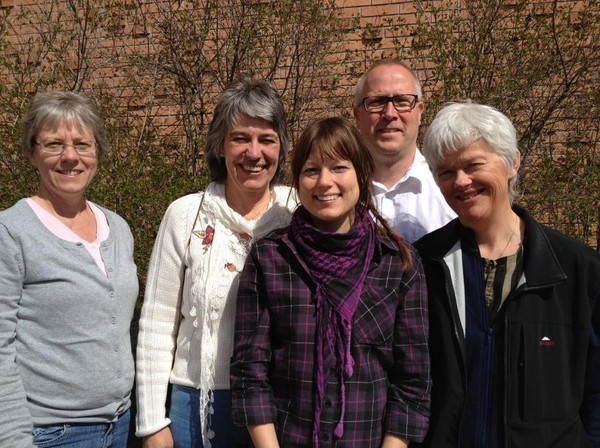Visions Yunnan/Härjedalen - Några av studenterna i Härjedalens tankar
YUNNAN/HÄRJEDALEN
Mina tankar om framtiden är att jag vill arbeta som förskolelärare.
Om jag bor själv vill jag bo i en lägenhet, men om jag bor med någon annan så vill jag bo i ett hus. Jag vill i alla fall ha en hund.
Det som gör mig lycklig är att folk som jag tycker om är glada, lyckliga och är friska. Jag tycker också om att dansa bugg och foxdrot. När jag får göra de då blir jag lycklig.
Om 20 år så tror jag att det har blivit större städer och fler städer här och där. De kan vara bättre med hus och jobb.
Men det kan vara sämre med pengar, fattigdom och naturen. De som jag menar med naturen så syftar jag på att det kan komma mer föroreningar i naturen
Alla kan påverka miljön. Man kan påverka miljön igenom att köpa närproducerad mat. Och man kan gå eller samåka till jobbet.
Naturen betyder mycket för mig, för jag bor så pass nära naturen. Jag älskar att vara ute i naturen och gå och fota naturen. Jag tycker om att vara i naturen för det är fint där ute.
Skolan betyder faktiskt ganska mycket för mig. För jag vill veta hur saker och ting fungerar i världen.
Vad tror ni kommer att hända i framtiden?
YUNNAN/HÄRJEDALEN
Jag ser väldigt ljust på framtiden och ser fram emot att få bli vuxen och påbörja vuxenlivet.
Jag har länge varit väldigt säker på vad jag vill i framtiden; till och börj med tänker jag gå klart
gymnasiet här i Sveg och jag satsar på att få höga betyg för att sedan kunna studera journalistik i
London i tre år. Då jag har fått en fullständig journalistutbildning vill jag flytta vidare till New York
där jag vill bli en framgångsrik journalist. På sidan om vill jag designa smycken och så småning om
starta ett eget modemagasin. Jag vill leva ett fartfyllt och spännande liv med mycket utmaningar,
resande och lycka. Vad som gör mig lycklig idag skulle jag säga är kärlek, så som familj och vänner,
att få vara kreativ, skriva, shopping och mode.
Om 20 år tror jag att framför allt tekniken har blivit bättre än den redan är idag då den
utvecklas för var dag som går. Dessutom så både tror och hoppas jag att vi blivit bättre på ta hand
om våran jord, då jag anser att det är väldigt viktigt att vi tar vara på jorden vi skapat. Som tur är så
tror jag nog att vi trots allt blir bättre och bättre på det.
Skolan för mig betyder väldigt mycket då jag anser det väldigt viktigt för mig att gå ut med
höga betyg för att sedan kunna läsa vidare och förr eller senare uppfylla min stora dröm.
YUNNAN/HÄRJEDALEN
1. I framtiden tror jag att jag har en familj och ett arbete. Jag bor i en stad någonstans i Sverige. Jag vet inte riktigt vad jag vill jobba med i framtiden, men först vill jag studera någonstans. Min dröm är att bli fotbollsproffs och spela i ett fotbollslag i England. Jag tror att jag har en fru och 2 barn. Jag vill helst tjäna mycket pengar, då är det lättare att försörja sig och sin familj.
2. Om 20 år tror jag att världen har blivit sämre. Jag tror dock att den är på bättringsvägen. Idag finns det mycket i världen som inte är bra, tillexempel fattigdom och växthuseffekten. Men om 20 år har nog konsekvenserna börjat synas och då gör folk allt för att det ska bli bra igen.
3. Jag har stor möjlighet att påverka världens framtid. Alla kan påverka världens framtid. Om alla gör en liten sak så blir slutresultatet mycket större.
4. Naturen och miljön har stor betydelse för mig. Utan den kan vi inte leva. Utan den skulle jorden gå under.
5. Skolan har också stor betydelse för mig, även fast den ibland är väldigt tråkig. Utan skolan får jag ingen utbildning och troligen inget jobb heller. Skolan är mycket viktig.
YUNNAN/HÄRJEDALEN
Jag har ingenaning om vad jag vill jobba med när jag blir större. Något med ekonomi helst. Jag skulle vilja testa på att jobba i någon affär. Den får dock inte vara för stor och ingen mataffär. Kanske att jag och någon kompis startar eget..
Jag är en tjej som spelar ishockey och jag har alltid sagt att jag skulle vilja spela i landslaget. Det har varit min dröm. Juniorlandslaget eller Damkronorna spelar ingen roll. Tyvärr känns landslaget väldigt långt borta just nu. Annars så har jag väl andra drömmar också som de flesta har. Man vill ha ett bra jobb, tjäna bra med pengar, bo fint och så småning om kanske skaffa familj.
Jag skulle vilja bo i ett stort fint hus, gärna med bastu och pool. Jag skulle också vilja ha en fin sjöutiskt eller havsutsikt eller varför inte fjällutsikt.. Jag vill också ha djur på min gård. Någon hund, katt och om tiden finns kanske jag skulle vilja skaffa några hästar också.
Jag blir lycklig och glad av att spela ishockey, men jag blir också lycklig och glad när jag ser att min familj, släkt och vänner mår bra.
Jag tror att världen har blivit lite varmare. Och det är ju dåligt eftersom isarna smälter snabbare då. Det blir ännu varmare och torrare på de ställen där det redan är varmt och torrt. Men jag tror inte att det blivit allför dåligt, vi har ju börjat inse att vi måste göra något åt till exempel utsläppen och på 20 år måste vi ha hunnit hitta lösningar.
Ja det har jag. Vi kan göra massa saker men några exempel är att jag kan gå eller cykla istället för att åka bil. Jag kan välja närproducerade produkter så de inte har fraktats över halva jorden och då släpps inga onödiga utsläpp ut. Jag kan ta reda på el med hjälp av solceller.
Naturen och miljön betyder en hel del för mig. Jag bor ute i skogen så jag vistas i naturen rätt ofta. När jag hör ordet natur tänker jag på tystnad, någon svalkande vind och lite fågelkvitter här och där. Naturen för mig är en plats där jag kan koppla av, vara borta från alla billjud och annat ljud som finns. Jag kan bara vara vilket är väldigt skönt och viktigt ibland. Naturen är också väldigt fin.
Skolan för mig betyder mycket, speciellt nu när jag börjat gymnasiet. Skolan är en plats där jag ska lära mig saker. Det är där jag börjar plugga och lära inför min framtid och mina framtida jobb. Självklart är det då viktigt att man tar in så mycket information och fakta som möjligt och att jag alltid gör mitt yttersta. Men skolan är också en plats där jag träffar och umgås med mina kompisar.
- Vid vilken ålder börjar ni i skolan?
- Hur länge varar grundskolan?
YUNNAN/HÄRJEDALEN
Jag går första året på ´gymnasiet i Sveg.
Det som gör mig lycklig är min familj, kompisar och saker jag gillar att göra tex skratta, åka slalom, köra cross, köra skoter och vara ute i naturen.
För mig är det viktigt med natur för att jag kan koppla av i naturen, få frisk luft, det finns många intressanta djur, jag är same vilket innebär att jag har renar som jag kommer livnära mig på så det är extra viktigt för mig att värna om miljö och natur, och både människor och djur kan inte leva utan frisk luft och träd så det är viktigt att värna om träden och växter, Vad jag som person kan göra ära att köpa miljövänligt, närproducerat och sortera soporna.
Om vi människor inte värnar om miljön kommer vi inte kunna leva men jag tror att vi människor börjar förstå det nu och kommer jobba för att bibehålla miljön. Världen kommer nog att bli både bättre och sämre i framtiden som vissa sjukdomar kan man inte bota idag men om tjugo år kan man säkert det, men om tjugo år kommer det att finnas nya sjukdomar som man inte kan bota.
Min dröm är att jobba som pilot i USA där jag bor i ett fint hus med min man och hund. För att jag ska kunna bli pilot måste jag ta skolan på allvar och göra mina studier annars kommer jag aldrig bli det jag vill.
Fråga:
hur är jämställdheten i Kina? Finns det vissa yrken som är förbjudna för män eller kvinnor?
YUNNAN/HÄRJEDALEN
1. I framtiden skulle jag vilja jobba som ridande polis eller travtränare, bara mitt yrke handlar om hästar! Och jag skulle vilja leva på en hästgård lite söderut i landet.
2. Världen om 20 år har nog både blivit bättre och sämre, beroende på vad det handlar om. Avgasutsläpp kommer nog bara försämras och ozonlagret kommer bli tunnare.. Men tekniken kommer att förbättras och arbeten som industri grejer och så kommer nog enbart göras med hjälp av maskiner.
3. Jag tror inte att just JAG skulle kunna ändra något i världen om jag inte kommer med något storslaget som tar alla med storm eller så.
4. Jag älskar na turen men kanske inte just på det sättet, det är inte så att jag tänker så mycket på miljön med tanke på utsläppen och de. Och det kanske jag borde göra för om ozon-lagret spricker så dör jag ju, och jag om någon är verkligen jätte rädd för att dö.
5. Skolan för mig betyder ingenting egentligen. Jag skulle bara vilja sova mig igenom 3 år nu. Men det är bara för att jag har det så stressigt jämt, tränar i princip alla dagar i veckan och det blir väldigt många "kvällen innan" eller att jag gör saker samma dag. Därför vill jag bara att skolan ska försvinna eller att ett lättare sätt att gå i skola skulle uppfinnas.
6. Att vad de än gör så borde dom inte flytta till Härjedalen för här är det bara kallt och jävligt hela tiden, fast dom borde komma hit någon gång på vintern för det är då det är som bäst.
7. Hur dom tror att det är att bo i Sverige, hur deras bild på Sverige ser ut ?
YUNNAN/HÄRJEDALEN
Just nu går jag i ettan på naturvetenskapliga linjen på gymnasiet i Sveg. Jag ser ljust på min framtid, efter gymnasiet vill jag studera vidare kanske till barnläkare eller utbilda mig inom miljöfrågor. Jag går på Skidlinjen och min allra högsta dröm är såklart att få åka i svenska skidlandslaget. Tänk att få ta en OS-medalj men är sådan dröm är svårt att göra verklig! För att jag ska lyckas med det kommer all min tid att krävas och jag kommer att få göra uppoffringar. Men jag är beredd att satsa. Skulle jag inte lyckas nå hela vägen vill jag ah en stadig grund att stå på. Jag vill kunna välja vad jag vill göra och i framtiden vill jag ha man, barn och hus. Jag vill bo kvar i norra Sverige och ge mina barn en bra uppväxt.
Det finns mycket som gör mig lycklig. Men lyckligast är jag nog när jag har en toppen dag, formen är perfekt, träningen bara flyter på. Jag fick reda på ett toppen resultat i skolan samtidigt som min kära farmor ringer och vi pratar jättelänge. Min familj gör mig lycklig! Jag står min lillasyster jättenära och jag längtar efter hela min familj nu, eftersom jag bor i Sveg ensam.
Jag hoppas att världen ser ungefär likadan ut om 20år som nu. Visst vill jag att forskningen har gått framåt inom miljö och sjukvård. Jag tror och hoppas att vi har minskat koldioxidutsläppen. Det är viktigt för att världen ska fortsätta finnas. Jag skulle kunna tänka mig att om ännu längre tid kommer man att få speciella resor, alltså kanske att du bara får åka flygplan 10 gånger i ett liv. Det är en gissning men varför skulle inte det kunna bli ett alternativ. Så jag vet inte riktigt om det är bättre eller sämre. Utvecklingen borde göra det bättre men man vet aldrig.
Man kan påverka världens framtid genom att engagera sig inom världspolitik. Eller bara genom enkla saker som att ta cykeln istället för bilen. Sopsortera och handla rättvisemärkt eller ekologisk mat. Det är småsaker för oss men det kan spela stor roll i det hela. Tänk om 6 miljarder människor sopsorterade bara. Så mycket vi skulle kunna göra biogas av tillexempel.
Tänker jag på ordet natur dyker just skogen upp. Härliga löprundor eller när familjen åker och plockar blåbär i skogen. Jag tänker också på djuren i naturen. Naturen för mig är ett lugnt och fridfullt ställe. Där man kan rensa tankarna eller bara få ny energi. Skogen och naturen är livsviktig för oss alla! Miljö är något helt annat, i alla fall för mig, miljö är något tjatigt men enkelt. Efter allt tjat som vi har hört i hela vår uppväxt har jag tröttnat lite på de vanliga frågorna. Jag vill höra nya förslag och saker vi kan göra. För miljön är jätteviktig, det är den viktigaste samhällsfrågan enligt mig. Eftersom det är nu vi måste förändra. Vi kan inte skjuta det på framtiden för då finns det ingen framtid.
Skolan är viktig för mig. Den är plattformen vi ska stå på när vi en dag sak klara av allt själva och hitta ett jobb. Att få en bar utbildning innebär att du kan utbilda dig vidare och bli det du vill. Jag tror att alla vill kunna välja det är det som är det viktiga för mig. Då undrar jag vad som är viktigt för er? Och varför? Hur mycket har ni fått höra om miljö i skolan? Vad får ni lära er och vad gör du för att hjälpa miljön?
YUNNAN/HÄRJEDALEN
Hej! Jag är 15 år och bor i Sveg med mamma pappa och mina syskon. Jag älskar fotboll och spelat sen jag var liten. Jag älskar min skolan där mår jag alltid bra, för skolan har gett mig mycket. Jag gillat och ha kul och hänga med mian kompisar och skoja. Jag tycker man ska leva idag och inte tänka på imorgon. Ha kul den tiden du har kvar.
Det är otrolig snälla lärare här i skolan och jag trivs väldigt bra och man behöver inte plugga så hårt man får ta sin tid och tränan på läxa, men så klart finns det viss tid man ska lämna in läxor och allt.
Jag har väldigt höga förväntningar från min skola. Jag har väldigt mycket kvar att lära mig.
Mina drömmar är väldigt stora jag har väldigt många drömmar. Men min största dröm är ju att bli läkare men jag vet inte hur det kommer och gå eftersom det behöver mycket matte och det är inte min starka sida. Hur jag vill leva i framtiden de vet jag inte än för jag har inte tänkt på det för jag tycker man ska leva nu och inte tänka på imorgon så vi får se hur det blir.
Världen om 20 år kommer inte se ut som det gör tror jag men jag vet inte heller hur det kan se ut men jag gissar på att det kommer och vara väldigt häftig och cool.
Jag tycker Kina är ett väldigt coolt land och jag vill verkligen besöka Kina. Och ni är väldigt bra på tillverka saker och ting eftersom allt vi köper här i sverige står ”made in china”. Men jag har inte mer att skriva men det är väldigt trevligt att du läser mitt brev. Och ja hoppas att du skriver ett svar till mig. :) Med vänlig hälsning.



